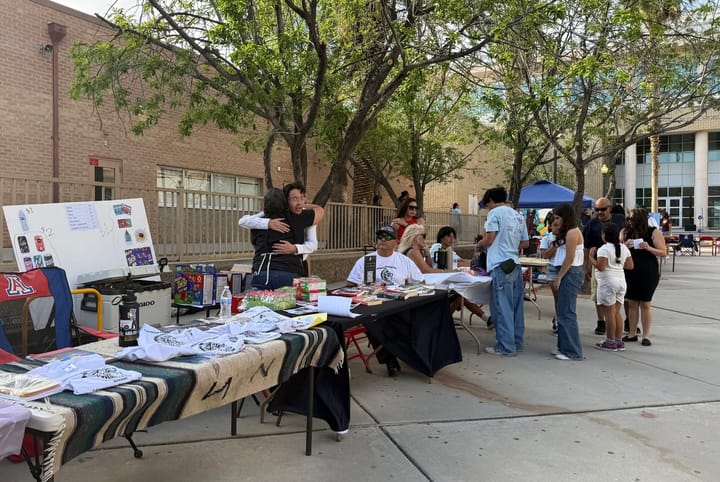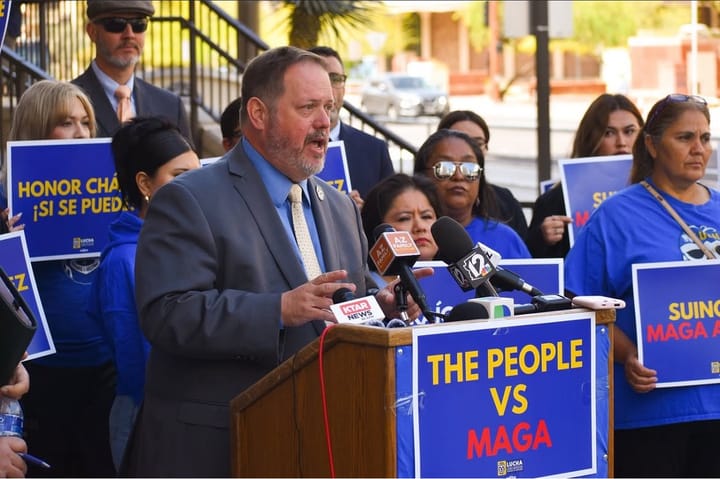Latin American women share stories of reproductive rights struggles
The work for reproductive and abortion rights extends beyond Arizona and even the United States, with women around the world facing different struggles.

With abortion rights in Arizona weeks away from being decided at the polls, a trio of storytellers from Latin America shared their experiences fighting for access during a recent event in Tucson.
The "Aborto es Salud" storytelling event coincided with International Safe Abortion Day, with state and local groups taking the opportunity to point out the struggles many women have faced since the 2022 U.S. Supreme Court decision saying the Constitution does not protect the right to an abortion.
The issue is on the minds of many Arizona voters, with Prop. 139, the Right to Abortion Initiative, appearing on November’s ballot. Groups like Arizona for Abortion Access and the Women’s Equality Center are working to get the word out about the importance of heading to the polls, but also of being part of a global movement to protect abortion rights.
One in five voters in the state signed the petition to get Prop. 139 on the ballot, but the work is far from over, Laura Dent, campaign manager for Yes for 139 Arizona, reminded attendees.
And that work extends beyond Arizona and even the United States, with women around the world facing different struggles when it comes to reproductive and abortion rights.
Paula Avila-Guillen, executive director of the Women’s Equality Center, highlighted the struggles and recent successes in Latin America, telling attendees about the “Green Wave” movements that originated in Argentina in the early 2000s to combat the high number of deaths among women due to unsafe abortions and lack of healthcare.
Activists united to create a coalition, using a green handkerchief as a symbol of hope and resistance inspired by the Las Madres de la Plaza Mayo, a group of women who protested the Argentine government’s violence during the Dirty War.

The Green Wave groups have been successful in influencing Latin American governments to expand access in a region with some of the strictest anti-abortion laws in the world.
In 2018, Avila-Guillen said, Argentina attempted to pass a law that would effectively legalize abortion on request and make it available in all hospitals and clinics. It was rejected by the senate, but in 2020, a bill was passed that legalized elective abortion up to the 14th week of pregnancy and kept it legal after the 14th week in cases of rape or if the women’s life or health is in danger.
The passage of this bill sparked similar changes across Latin America, including advancements in Colombia and Mexico, Avila-Guillen said, advocating for the release of women imprisoned in Latin America due to miscarriages and stillbirths.
Cristina Quintanilla was on hand to speak about her own experience being imprisoned in El Salvador following a miscarriage. When she was 18, she became pregnant with her second child, but encountered complications that resulted in a miscarriage.
She was taken to the hospital for surgery and when she woke up, she found herself handcuffed on a hospital stretcher.
She said she was arrested for the “murder of her son” and spent a year in provisional detention during her trial. A year later, she was sentenced to 30 years in prison.
“I had a son, I lost my family, I lost the best moments of my life, of being with my little son. And since I was in prison, I could not bury the son I lost,” Quintanilla said.
After spending four years in prison, she received a sentence commutation after it was decided that the penalty was excessive and disproportionate.

But her struggles weren’t over, as she found it difficult to reintegrate into society with a criminal record.
“I still live with that nightmare, because although I applied for political asylum and I am in the process, the work permit has been denied because of my criminal background in El Salvador,” said Quintanilla, who now lives in Georgia.
She urged attendees to empower themselves and fight back against laws that criminalize abortion.
“It could be you, it could be your daughters, it could be your brothers, you don’t know,” Quintanilla said.
One of these stories is featured in the newly released animated short film “Romina,” about a 14-year-old girl who became pregnant in a state with a total abortion ban.
Paoloa Mendoza was a longtime acquaintance of the family and one of the first people to learn about Romina’s pregnancy, when she and her mother reached out for help.
Mendoza quickly mobilized a network of 21 people to help Romina receive the care she needed in New York, and captured the story in the film.
“It’s been inspiring because I truly believe what I say in the film, that laws will not stop abortions because we, the people, won’t let them,” Mendoza said during the event.
Isabela Gamez is a University of Arizona alum and reporter with Tucson Spotlight. Contact her at gamezi@arizona.edu.




